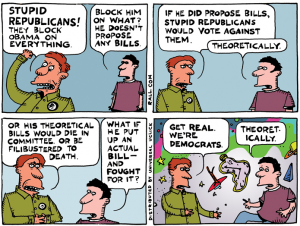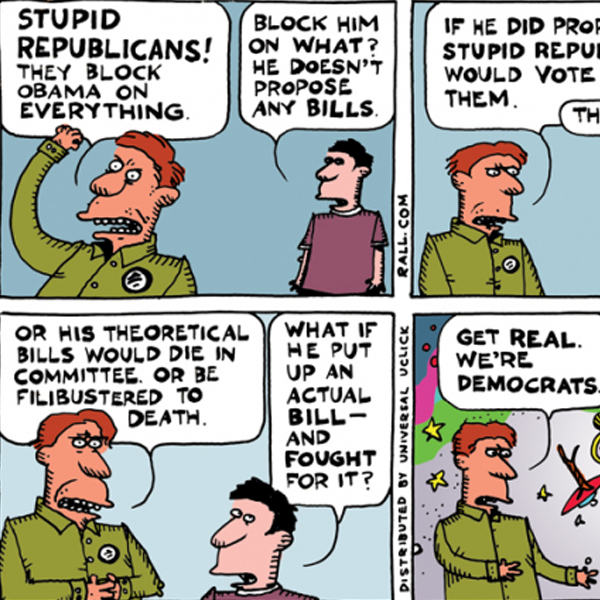aNewDomain commentary — Trying to wrap your head around the 2014 midterm election results? Our Ted Rall says it’s about the economy and the two-party system, stupid. Analysis. Understanding the 2014 Midterm Election Results: It’s the Economy and the Two-Party System, Stupid
Wednesday morning quarterbacking yesterday’s midterm election results is bringing out a lot of the usual claims that everything is changed, nothing has changed and anyway, what does it all mean for the 2016 presidential race.
I’ll leave the partisan politics to the Democratic and Republican surrogates and paid pollsters whose job it is to, respectively, make their side look less bad or better than it deserves. My interest is the big picture, so that’s what you’re going to get here.
 Exit polls – considered highly reliable indicators of voters’ mindsets because they are conducted right outside polling stations – found that, hands down, the economy was what was on people’s minds when they cast their ballots.
Exit polls – considered highly reliable indicators of voters’ mindsets because they are conducted right outside polling stations – found that, hands down, the economy was what was on people’s minds when they cast their ballots.
From NBCNews.com: “Asked to select the most important of four issues – the economy, health care, illegal immigration and foreign policy – 44 percent pointed to the nation’s economy.”
The reason that that is so interesting is that neither party made jobs or the economy the centerpieces of their campaigns in this year’s congressional or gubernatorial races. This was a year of record spending on ferocious attack ads centered on allegations of local corruption and, when national issues came up, the candidates ties to or opposition to President Barack Obama and his policies – such as the Affordable Care Act, the federal government’s response to ISIS and the Ebola outbreak in West Africa.
Even more interesting is the vast chasm between the relentless media drumbeat, which declared economic recovery back in 2010 and hasn’t let up ever since, and a public that believes overwhelmingly that the economy is either exactly as bad as it was back then or is actually getting worse: “About a third – 34 percent – said they believe the economy is getting better, while a majority – 58 percent – said that the economy is either poor and staying the same (27 percent) or getting worse (31 percent.)”
Republicans took back control of the U.S. Senate and picked up gubernatorial seats across the nation, including some that were anything but a shoo-in, so it isn’t surprising that so many pundits are succumbing to the temptation to declare this some sort of mandate for the GOP or a mass repudiation of Democratic policies like Obamacare.
Not that Democrats should take comfort in what I am about to say, but I don’t think that is what’s really going on.
Bear in mind, approval rating of the United States Congress was at a rock-bottom 14% going into the elections. Contempt for both parties is and has been bipartisan: Americans believe both parties are failing to take action on the issues they care about most.
In other words: jobs. Good jobs with high salaries.
Namely, the lack thereof.
Particularly since the 2008-2009 economic meltdown, the middle class has been hurting badly. Millions of people have permanently dropped out of the workforce. Real raises – double-digit raises that exceed inflation – seem to be ancient history for the foreseeable future. And this follows four decades of increasing income inequality, stagnating or shrinking real wages, and a brutal boom-bust cycle of capitalism in which people spend their relatively prosperous years paying off the debt they built up during increasingly numerous, deeper, longer recessions.
President Obama’s 2008 hope and change campaign built up high expectations for what might be possible, the so-called “audacity of hope.” But that soaring optimism was dashed on the rocks of, depending on where you stand, Republican obstructionism, Democratic cowardice or institutional corruption. Whatever the cause, Congress and the president have never focused on direct government involvement in creating jobs or stimulating the economy in a meaningful way.
When voters see the political class ignore the things that they care about most, the pocketbook issues that affect them every day, they want to vote the bastards out and put someone who might do better in. But that’s not an option in a two-party system. There are Democrats, Republicans, and third-party candidates who, due to a variety of reasons that begin with the collusion of the two major parties, don’t stand a chance.
One way that voters can express their anger is to stay home on election day. The problem with that is, the media and political pundits conflate disgust with apathy and laziness. That leaves one other option: voting against incumbents.
This is a cycle we’ve seen a lot over recent decades, especially during midterm elections. It’s an attempt to get the attention of the politicians, to say look at us, we are angry, why don’t you do anything about the issues we care about?
Last night’s results don’t tell us much about the relative standing of the Democratic and Republican parties. They do, however tell us a lot about the state of mind of the American people.
They’re mad as hell – but for the time being, they’re going to keep taking it.
For aNewDomain, I’m Ted Rall.
Cartoon: Ted Rall














Until we heard the results, my wife & I were seriously discussing returning to the U.S. but who wants to live in a Republican-dominated society that is destroying all progress? We’ll remain in Mexico, where there are no pretenses. :(
There’s a lot to be said for clarity.
Get real, over the last century or so, America has despotically developed a ONE PARTY system.
THAT ONE PARTY is the Fascistically CAPITALIST political party. In Kabuki fashion, this party has a bi-corporately split, institutional “personality.”
The Dems and the Repugs are like a football league with only two teams, say, the Washington Redbloods and the Dallas Cowpunks. Ultimately, they both productively endorse only what the controlling football league wants. The fans (voters)? They’re just the rubes who are forced to perpetually pay for all the culturally destructive, Kabuki drama, dreamed up and militarily enforced by the league’s law-enforcers.
Democracy? Give me a fckn break, we live in a corporate welfare state.
DanD
Well said Ted. I’ve spent a 40-year career in political hackery and policy wonkery and I’ve witnessed this slow and painful dissolving of the public trust in government (which was never that high to begin with) that is often (not always) accompanied by odd demands on government. Where the Dems really screwed up was not pointing out what austerity has meant to Europe and how the Dems should have actually done more in 2009 in terms of the stimulus. The Prez is missing a “leadership chip,” but I can’t lay this all at his feet. Harry Reid is never going to get his own chapter in the revised version of “Profiles in Courage.”
I agree completely and was wondering why no one was highlighting the economy when good news was flowing in right before the election. Odd, that. At any rate Republicans have no excuses now for not getting something done, right? Haha! We’ll see.
So… the GOPranos made Ebola, ISIS, and the ACA centerpieces of their campaigns, eh?
Talk about building yourself a glass house. They can’t invade Ebola (as Ted noted elsewhere) The ACA is not only working, but fairly popular – they could hold another showboat vote but they’d be shooting themselves in their collective foot if they actually repealed it.
That leaves ISIS, and we know what their response will be on that – massive military spending. While that will be popular with the chicken hawks, they’ll just be pouring more gasoline on the same old fire.
So, in 2016, the voters will remember the promises, compare them against their actual progress … and vote a straight party line. Again.
:: sigh ::
It’s been a two-plutocratic-party-system from the first, but from 1980 (Wall Street wipeout behind Reagan of GOP) or 1984 (Wall Street wipeout via DLC of Dems) it’s been Wall Street all the way:
Clinton conglomerated and deregulated the bank-trusts, Bush II launched them against us, and Obama’s been driving the getaway car for six years.
It’s always been a plutocracy, but when we were ruled by industrialists, at least the plutocrats were competent. Wall Street is built entirely out of middlemen, and the most worth they can claim is that they facilitate the efforts of others. Put them in charge of things and the whole economy turns into a casino on a downward spiral to bankruptcy.